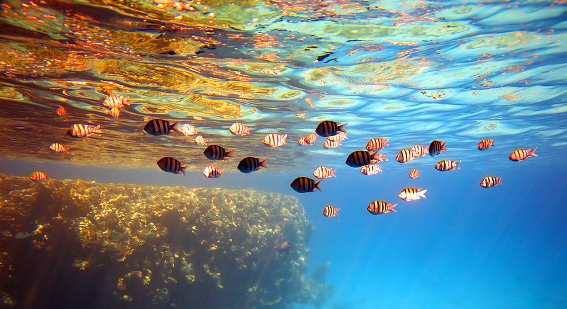
Good news: You don't have to drink like a fish to stay well hydrated.
Drink more water! Lots more water! This seems to have become almost mandatory advice for healthy living. But how much water do you actually need, particularly if you aren’t really that fond of the taste?
These days, in the US at least, you often hear a mantra of eight eight-ounce glasses of water as the minimum adult daily intake. This roughly parallels the 1.5 to two liters endorsed by the British Nutrition Foundation. One and a half liters may sound like a significant amount of H20, but it is still less than the two to three liters recommended by the WHO, or the six to eight liters promoted by many athletic trainers.
Conversely, a 2008 study by the University of Pennsylvania found no benefits from drinking increased amounts of water. Confused? You’re not alone. It doesn’t make much sense for a small-framed person on a vegetarian diet, naturally high in water, to have the same needs as a chunkier bod who eats a lot of processed foods. Plus, even people living in very arid regions seem to do just fine without their daily 8 x 8.
Avoiding the drys
A more effective approach to the hydration issue is to keep liquids at hand and drink as much as is comfortable. Having a dry mouth or lips is an obvious sign you have already lost some hydration and need to drink a little more to stay ahead of the curve. Likewise, if your urine is dark, it is probably a good idea to reach for an extra glass. This is one case where a pale yellow color is a desirable thing.
There are also many other less obvious indicators of low intake. Water improves blood flow, making the heart’s job easier, plus it helps to flush toxins from the kidneys, which can increase fat loss. So simply feeling sluggish could be a sign. Admittedly that is a fairly generic symptom but the extra oxygen (H two O) will at least supply a shot of energy. Constipation, meanwhile, is a clearer signal you would probably benefit from a couple of extra glasses, as is dry skin.
Basically, your body will tell you when you need more water. You should not, however, go too far down the more is better path. Excess intake can actually cause water intoxication leading to brain swelling and, ultimately, death. You would have to chug a lot of liquid in a relatively short time to do yourself much harm, but it can affect athletes, people on “detox” programs and new arrivals in hot countries.
Avoiding the gag
As beneficial as straight water is, many people just cannot handle the taste of large volumes. But who says you have to? There are a host of other options available, including fruit and vegetable juices, smoothies, soups, teas, kefirs and nut milks. As well as helping to maintain hydration, these liquids have the added advantage of delivering a boat load of nutrients in easily digestible form.
Coconut water – the liquid from the young fruit, not to be confused with coconut “milk” – has been receiving a lot of attention recently. For good reason. It contains high levels of electrolytes and antioxidants and is ideal in the hotter Summer months or post-workout. But we can obtain significant amounts of liquid even from solid foods, particularly fresh fruit and vegetables. Water melon was so named for a good reason and makes a great base for summer smoothies. (See below.)
About the only liquid that shouldn’t be on your list is soda. Sure it is wet but it either contains a huge amount of calories or if it is low-cal, some fairly nasty artificial sweeteners that have been shown to stimulate appetite, actually encouraging people to eat. Add in the artificial flavorings, colorings and preservatives and you’ve got a really toxic brew. Even coffee and alcohol are fine in smaller quantities, having minimal diuretic effect, but leave the soda be.
Naturelicious smoothies
Smoothies are an excellent way to stay hydrated and boost your nutrient intake. They also taste excellent. Yes, even the green ones!
Melon punch
2 handfuls of watermelon
1 handful of pineapple
1 golden kiwifruit
1 handful of ice cubes
Ginger, lemon, lime to taste
Whizz everything up in a blender and if the mixture is too thick, or too sweet, add a little
water. Avoid overchilling from adding too many ice cubes as this can shock the stomach.
